汉语常见句式的英译
英汉直译汉语对话和常用型总结
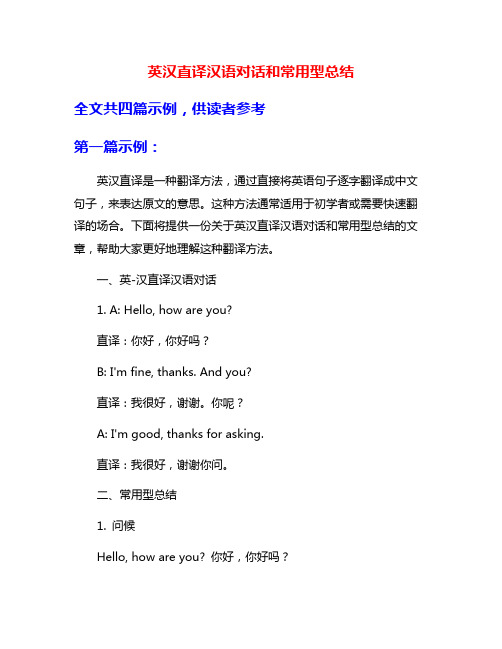
英汉直译汉语对话和常用型总结全文共四篇示例,供读者参考第一篇示例:英汉直译是一种翻译方法,通过直接将英语句子逐字翻译成中文句子,来表达原文的意思。
这种方法通常适用于初学者或需要快速翻译的场合。
下面将提供一份关于英汉直译汉语对话和常用型总结的文章,帮助大家更好地理解这种翻译方法。
一、英-汉直译汉语对话1. A: Hello, how are you?直译:你好,你好吗?B: I'm fine, thanks. And you?直译:我很好,谢谢。
你呢?A: I'm good, thanks for asking.直译:我很好,谢谢你问。
二、常用型总结1. 问候Hello, how are you? 你好,你好吗?I'm fine, thanks. And you? 我很好,谢谢。
你呢?2. 询问喜好What's your favorite color? 你喜欢什么颜色?My favorite color is blue. 我喜欢蓝色。
3. 询问来自Where are you from? 你来自哪里?I'm from China. 我来自中国。
4. 职业What do you do for a living? 你是做什么工作的?I'm a teacher. 我是个老师。
5. 语言能力Can you speak any other languages? 你会说其他语言吗?Yes, I can speak French and Spanish. 是的,我会说法语和西班牙语。
通过以上的例句和总结,我们可以看到英汉直译的特点是直接将英语句子逐字翻译成中文句子,虽然有时候不太符合汉语的表达习惯,但可以帮助初学者更快地理解英语句子的意思。
希望大家能够通过这种方法提高自己的英语水平,更好地与外国人交流。
第二篇示例:英汉直译是指将英文对话逐字直译成中文,这种翻译方式可能会导致表达不够自然或者不太符合中文习惯。
汉语兼语式谓语与汉英对应表达

汉语兼语式谓语与汉英对应表达汉语中的兼语式谓语(也称为双宾语结构)是指一个动词的宾语可以有两个,一个是直接宾语,一个是间接宾语。
而在英语中,这种结构通常只有一个宾语。
下面是一些常见的汉语兼语式谓语和对应的汉英表达:1. 给……送礼物:give sb. sth. as a gift/present例如:我给她送了一份生日礼物。
I gave her a birthdaygift/present.2. 借……钱:borrow money from sb.例如:我向他借了一些钱。
I borrowed some money from him.3. 问……问题:ask sb. a question例如:他问了我一个问题。
He asked me a question.4. 告诉……消息:tell sb. some news例如:我告诉了她这个好消息。
I told her the good news.5. 留……电话:leave sb. one's phone number例如:我留下了我的电话号码。
I left my phone number with him/her.6. 送……花:send flowers to sb.例如:他送了一束花给她。
He sent her a bouquet of flowers.7. 给……打电话:call sb. on the phone例如:我给他打了一个电话。
I called him on the phone.8. 寄……明信片:send sb. a postcard例如:我寄了一张明信片给他。
I sent him a postcard.以上是一些常见的汉语兼语式谓语和对应的汉英表达,它们在日常生活中经常使用。
要注意的是,有些汉语兼语式谓语在英语中可能需要用到介词或其他语法结构来表达。
汉语句式 2 的英译
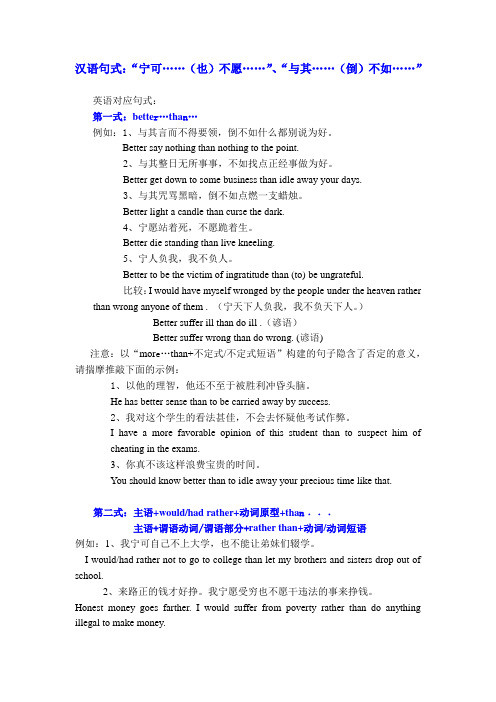
汉语句式:“宁可……(也)不愿……”、“与其……(倒)不如……”英语对应句式:第一式:bette r…tha n…例如:1、与其言而不得要领,倒不如什么都别说为好。
Better say nothing than nothing to the point.2、与其整日无所事事,不如找点正经事做为好。
Better get down to some business than idle away your days.3、与其咒骂黑暗,倒不如点燃一支蜡烛。
Better light a candle than curse the dark.4、宁愿站着死,不愿跪着生。
Better die standing than live kneeling.5、宁人负我,我不负人。
Better to be the victim of ingratitude than (to) be ungrateful.比较:I would have myself wronged by the people under the heaven rather than wrong anyone of them . (宁天下人负我,我不负天下人。
)Better suffer ill than do ill .(谚语)Better suffer wrong than do wrong. (谚语)注意:以“mor e…than+不定式/不定式短语”构建的句子隐含了否定的意义,请揣摩推敲下面的示例:1、以他的理智,他还不至于被胜利冲昏头脑。
He has better sense than to be carried away by success.2、我对这个学生的看法甚佳,不会去怀疑他考试作弊。
I have a more favorable opinion of this student than to suspect him ofcheating in the exams.3、你真不该这样浪费宝贵的时间。
汉语特定句式的翻译.
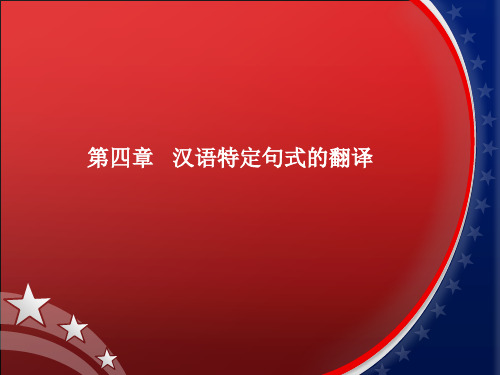
汉语句子英译要点
• (五)假设关系 • 倘若客人不来怎么办? • What shall we do if the guests fail to turn up? • 假若哥伦布没有发现美洲大陆,别人也会发现的。 • Even if Columbus had not discovered the continent of America,
汉语句子英译要点
• 句内关系的再现
• (一)并列关系 • 汉语中的并列和对照都属于并列关系,也就是指各分句之间在意义上
是并列的。在英译的时候,汉语的并列关系通常用英语中的连词and, 但如果是否定的并列关系,通常用neither…nor, either…or…等表示。 如:
• 天无二日,世无二主。 • Heaven can not support two suns, nor earth two masters.
汉语句子英译要点
• (三)选择关系
• 外商投资企业经企业申请,税务部门批准,可减轻或免征工商统一税。 • A foreign investment enterprise may apply to tax authorities and may
enjoy, if the application is approved, reduction or exemption of the consolidation industrial and commercial tax. • 他们宁愿待在家里而不愿意去观光。
had to scale snow stopped mountains and plod through the marshland ? • (3)学习先进,才有可能赶超先进. • One must learn from the advanced before he can catch up them and surpass them.
汉语句式 7 的英译
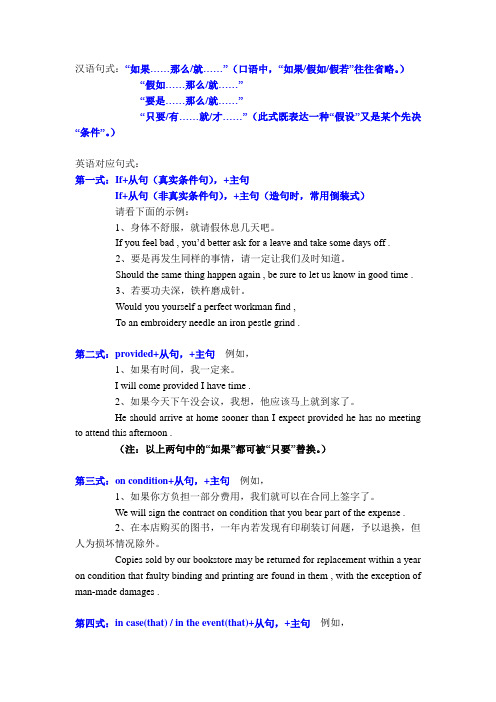
汉语句式:“如果……那么/就……”(口语中,“如果/假如/假若”往往省略。
)“假如……那么/就……”“要是……那么/就……”“只要/有……就/才……”(此式既表达一种“假设”又是某个先决“条件”。
)英语对应句式:第一式:If+从句(真实条件句),+主句If+从句(非真实条件句),+主句(造句时,常用倒装式)请看下面的示例:1、身体不舒服,就请假休息几天吧。
If y ou feel bad , you’d better ask for a leave and take some days off .2、要是再发生同样的事情,请一定让我们及时知道。
Should the same thing happen again , be sure to let us know in good time .3、若要功夫深,铁杵磨成针。
Would you yourself a perfect workman find ,To an embroidery needle an iron pestle grind .第二式:provided+从句,+主句例如,1、如果有时间,我一定来。
I will come provided I have time .2、如果今天下午没会议,我想,他应该马上就到家了。
He should arrive at home sooner than I expect provided he has no meeting to attend this afternoon .(注:以上两句中的“如果”都可被“只要”替换。
)第三式:on condition+从句,+主句例如,1、如果你方负担一部分费用,我们就可以在合同上签字了。
We will sign the contract on condition that you bear part of the expense .2、在本店购买的图书,一年内若发现有印刷装订问题,予以退换,但人为损坏情况除外。
汉语的基本句型及其翻译

汉英的基本句型及其翻译Sylvia Wang574521661@一、主谓单句1)鲁迅,绍兴人。
(主语+名词谓语)•Lu Xun was from Shaoxing. [SVP]2)这个姑娘很漂亮。
(主语+形容词谓语)•That girl is very pretty. [SVP]3) 这花儿是白的。
(主语+判断谓语)•The flower is white.[SVP]4) 水库是1958年修建的。
[主语+判断谓语]•The reservoir was built in 1958. [SV(passive)] 5) 他打破了杯子。
(主语+谓语+宾语)•He broke the glass.[SVO]6) 李先生教我们地理。
(主语+谓语+宾语+宾语)•Mr. Li teaches us geography.[SVOO]防止主语的机械对应•宁波多雨。
•Ningbo sees much rain.•It rains a lot in Ningbo.•People have much rain in Ningbo.•There is much rain in Ningbo.•中国近几年来发生了巨变.•China crackles with danamics of changes these years.•China has seen (withnessed) great changes these yeats.•These years have seen (witnessed) great changes in China.•There have been great changes in China these years.•Great changes have taken place in China these years.•花园里有许多孩子。
•There are many children in the garden.•门边卧着一只狗。
汉语句式 3 的英译
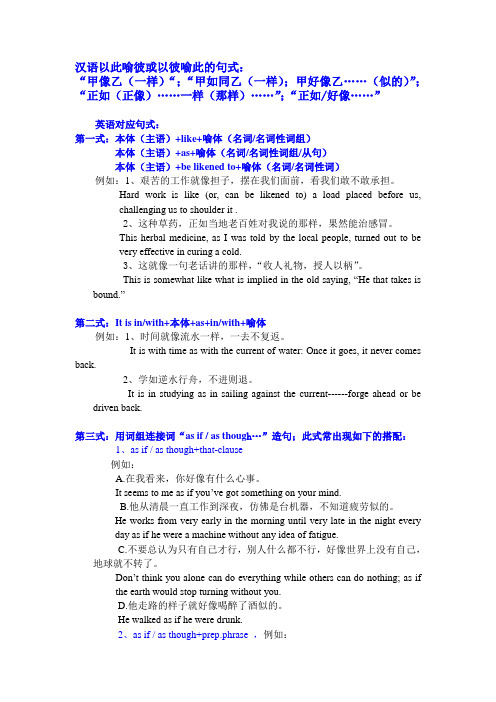
汉语以此喻彼或以彼喻此的句式:“甲像乙(一样)“;“甲如同乙(一样);甲好像乙……(似的)”;“正如(正像)……一样(那样)……”;“正如/好像……”英语对应句式:第一式:本体(主语)+like+喻体(名词/名词性词组)本体(主语)+as+喻体(名词/名词性词组/从句)本体(主语)+be likened to+喻体(名词/名词性词)例如:1、艰苦的工作就像担子,摆在我们面前,看我们敢不敢承担。
Hard work is like (or, can be likened to) a load placed before us,challenging us to shoulder it .2、这种草药,正如当地老百姓对我说的那样,果然能治感冒。
This herbal medicine, as I was told by the local people, turned out to bevery effective in curing a cold.3、这就像一句老话讲的那样,“收人礼物,授人以柄”。
This is somewhat like what is implied in the old saying, “He that takes is bound.”第二式:It is in/with+本体+as+in/with+喻体例如:1、时间就像流水一样,一去不复返。
It is with time as with the current of water: Once it goes, it never comes back.2、学如逆水行舟,不进则退。
It is in studying as in sailing against the current------forge ahead or be driven back.第三式:用词组连接词“as if / as thoug h…”造句;此式常出现如下的搭配:1、as if / as though+that-clause例如:A.在我看来,你好像有什么心事。
汉语句式 8 的英译
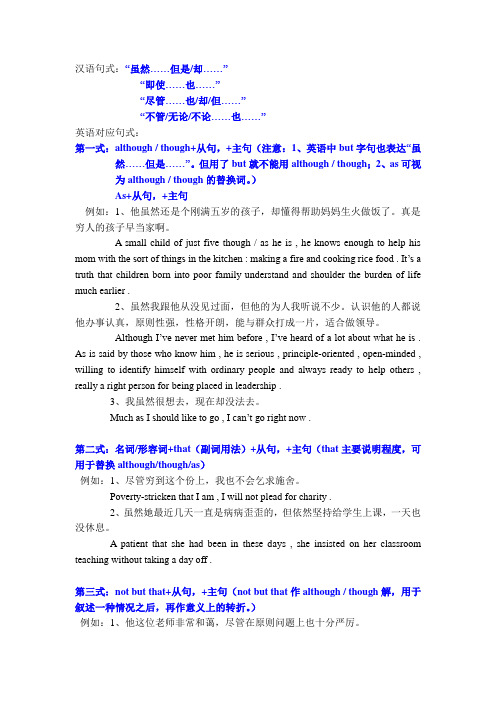
汉语句式:“虽然……但是/却……”“即使……也……”“尽管……也/却/但……”“不管/无论/不论……也……”英语对应句式:第一式:although / though+从句,+主句(注意:1、英语中but字句也表达“虽然……但是……”。
但用了but就不能用although / though;2、as可视为although / though的替换词。
)As+从句,+主句例如:1、他虽然还是个刚满五岁的孩子,却懂得帮助妈妈生火做饭了。
真是穷人的孩子早当家啊。
A small child of just five though / as he is , he knows enough to help his mom with the sort of things in the kitchen : making a fire and cooking rice food . It’s a truth that children born into poor family understand and shoulder the burden of life much earlier .2、虽然我跟他从没见过面,但他的为人我听说不少。
认识他的人都说他办事认真,原则性强,性格开朗,能与群众打成一片,适合做领导。
Although I’ve never met him before , I’ve heard of a lot about what he is . As is said by those who know him , he is serious , principle-oriented , open-minded , willing to identify himself with ordinary people and always ready to help others , really a right person for being placed in leadership .3、我虽然很想去,现在却没法去。
- 1、下载文档前请自行甄别文档内容的完整性,平台不提供额外的编辑、内容补充、找答案等附加服务。
- 2、"仅部分预览"的文档,不可在线预览部分如存在完整性等问题,可反馈申请退款(可完整预览的文档不适用该条件!)。
- 3、如文档侵犯您的权益,请联系客服反馈,我们会尽快为您处理(人工客服工作时间:9:00-18:30)。
汉语常见句式的英译
一主谓单句:
注意避免汉英主语的机械对应;汉语主语的变化角度比较少,英语主语的变化角度则比较多。
上海这个地方多雨:
It rains a lot here in Shanghai.
There is much rain here in Shanghai.
Shanghai often sees much rian.
People have much rain here in Shanghai.
It is often rainy here in Shanghai.
翻译汉语句子的非动词谓语时,要补加动词。
这个操作过程并不危险:
This operation is quite free from danger.
This operation process is not dangerous.
注意避免谓语的机械对应。
你搞什么鬼?What on earth are you up to?
他身体搞垮了。
He has ruined his health.
搞改革,要脚踏实地:We should have a down-to-earth spirit in carrying on our reform.
二无主语句
汉语祈使句不出现主语,英译时要依法照译:
请打开窗户:Open the window please!
汉语中有号召、标语、要求等意味的无主句,有时可译成祈使句,有时需要补上主语,视情况而定;汉语中叙事或论理的无主句,翻译时要加上主语;
有朋自远方来,不亦乐乎?It is not a delight after all to have friends come from afar?
汉语多省略上文出现过的人物,英译时要译出来;
汉语中,有些无主句是习惯用法,英译时可以用“there be”句型;也可以采用主谓句或者被动句。
剩下时间不多:There is very little time left.
以其人之道还治其人之身:pay somebody back in his own coin.
三流水句
这种句子比较松散,英译时,多译成以若干个以“主谓”结构为主干的分立单位或者平行散句,并根据句法需要适当添加关联词。
四主题句
这种句子翻译方法有:拆句法,倒置译法,还原法,对应译法
五连动句
动作同时发生或者又先后之分;翻译时,要选定一个主要动词用作谓语,形成“主-谓”主干,其他动词则视情况化作动名词短语、动词不定式、分词短语或者介词短语,依附于主干。
达到车站时,发现火车已经开走了:
Arriving at the station, she found that the train had left.
六兼语句
按照主-谓-宾-补句型把第二个动词转化成为宾语补足语
七意合句
指无关联词的复合句;翻译时先分析找出其中暗含的各种语义关系,然后选择相应的关联词或其他手段,把句子的深层涵义体现出来。
八主次信息句
这些句子表面上没有并列,没有主从偏正关系,但有主次之分,翻译时,要把主要的信息翻译成完整的句子,把次要信息译成独立结构,作为伴随状况和原因。
九长句
1 顺着原语序翻译;
2 变换语序翻译;3断句翻译。
